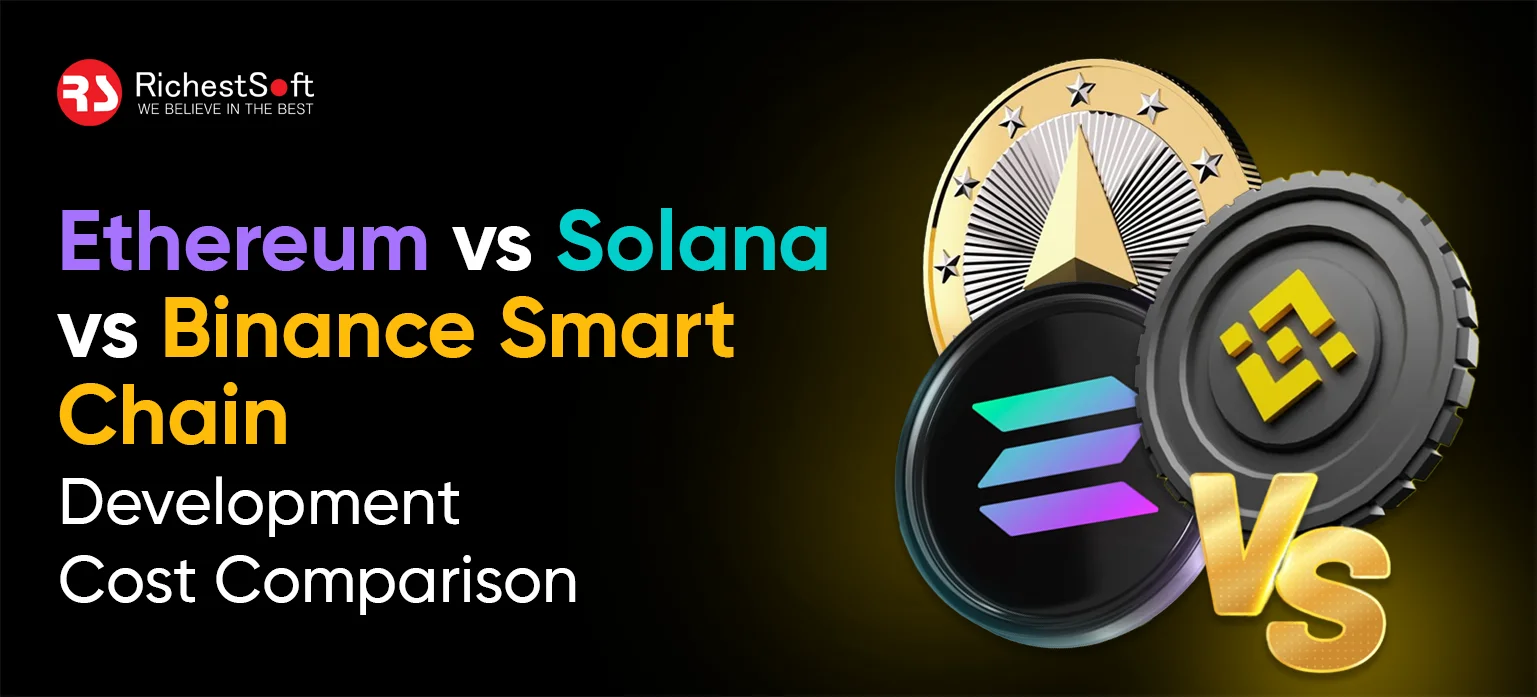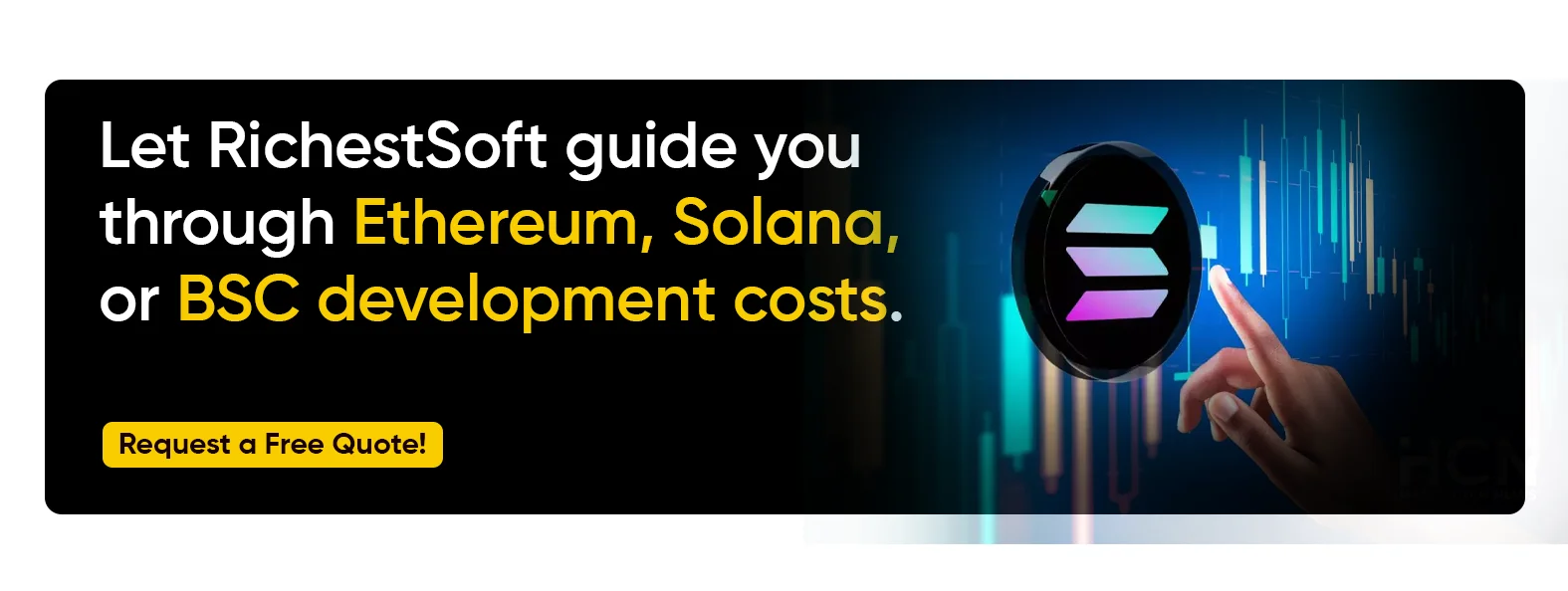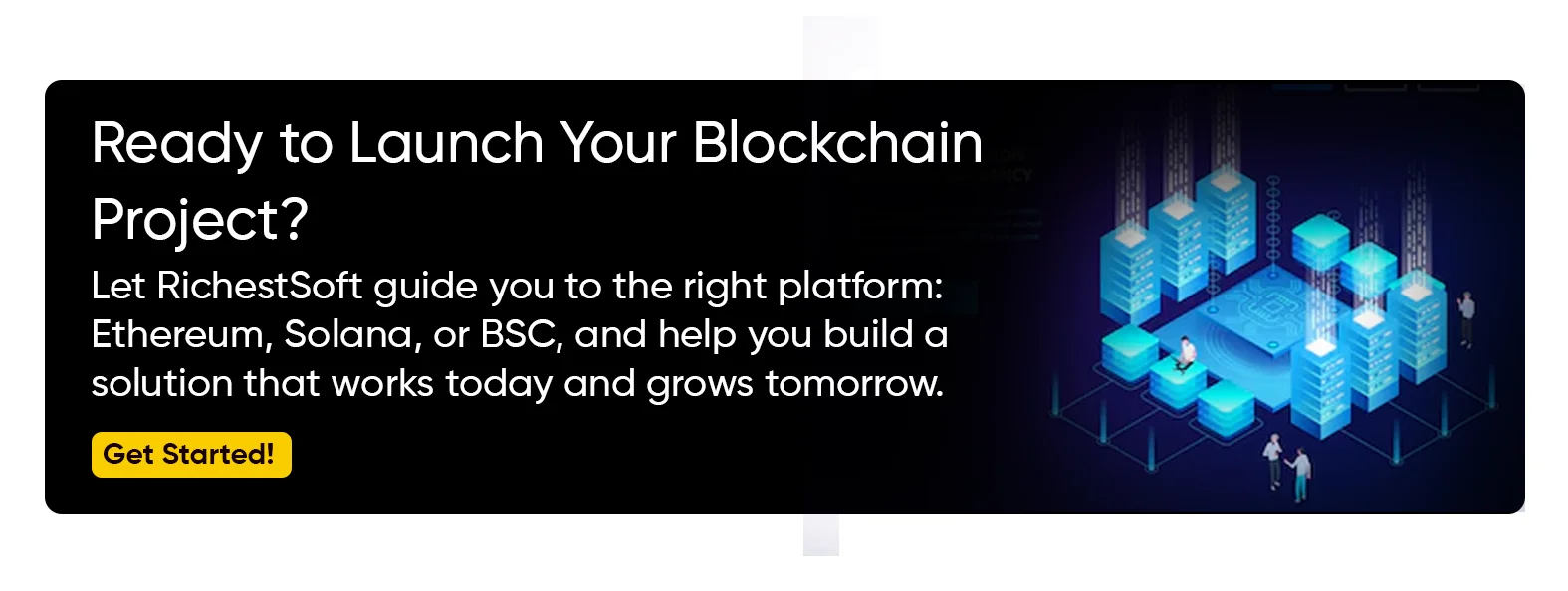September 18, 2025
Choosing the right blockchain platform has never been straightforward. The debate keeps resurfacing—developers trade opinions on forums, businesses weigh the risks before committing, and investors watch closely to see which network could lead the next wave of adoption.
Out of the many options available, three consistently stand out for building decentralized apps, DeFi projects, and NFTs: Ethereum, Solana, and Binance Smart Chain (BSC).
Each brings its own strengths, but none of them are the same. Their technical foundations, developer communities, and especially the cost of development vary widely. And when it comes to making real-world business decisions, that last piece—the cost—often makes all the difference.
Continue reading the blog to gain a clear understanding of Ethereum vs Solana vs Binance Smart Chain Development Cost.
Why Development Cost Matters So Much
When a company starts thinking about a blockchain project, it’s easy to get carried away with all the big ideas — decentralization, tokenomics, smart contracts, user experience. Sure, that stuff matters, but honestly, the budget often decides what you can actually do. Costs aren’t just about paying developers. You also have to deal with network fees, putting contracts on the blockchain, running tests, and keeping everything working over time.
If you spend too much on network fees right at the start, you might find there’s hardly anything left for marketing, getting users, or growing the platform. And if you just pick the cheapest option to save a few bucks? That can bite you later. You could end up with something that doesn’t work properly or that people don’t trust, and fixing it after the fact is usually a bigger headache. That’s why it pays to really look at the costs of building on Ethereum, Solana, or Binance Smart Chain. It’s not just numbers on a sheet — it’s about making sure your project actually works, can grow, and won’t leave you stuck with problems later.
Ethereum vs Solana vs Binance Smart Chain Development Cost Comparison
Take a closer look at the Ethereum vs Solana vs Binance Smart Chain Development Cost.
Ethereum: Reliable but Expensive
Ethereum has been around the longest and is credited with introducing general-purpose smart contracts. That head start allowed it to grow into the most established and resource-rich ecosystem in blockchain. For anyone seeking trust and long-term credibility, Ethereum continues to stand out as the go-to platform.
However, Ethereum is the priciest of the three.
- Developer rates: Ethereum developers tend to charge the most. Solidity expertise is in high demand, and while the talent pool is large, competition keeps rates elevated. For serious projects, you don’t want junior developers; you want people who know security pitfalls and best practices, and those profiles aren’t cheap.
- Gas and deployment fees: This is where many businesses get shocked. Deploying a smart contract can cost hundreds, sometimes thousands of dollars, depending on network congestion. And once live, every user action on your app burns gas. If you expect a high-activity app, costs can add up quickly.
- Ecosystem tools: The bright side is that Ethereum has the most polished frameworks. Libraries like OpenZeppelin reduce the need to reinvent the wheel, so while fees are high, development cycles can be faster.
For companies with funding, Ethereum remains attractive because of its security track record and reputation. But if you’re on a tight budget or trying to launch an MVP, those costs can be a deal-breaker.
Solana: Speed and Efficiency
Solana is often positioned as the “Ethereum alternative.” Its pitch is simple: it’s fast, cheap, and scalable. And it delivers on a lot of that promise.
- Transaction fees: Almost negligible. Transactions cost fractions of a cent. For NFT marketplaces or blockchain games that need high throughput, it makes a huge difference. Users aren’t scared away by $10 fees just to move a token.
- Deployment: Deploying on Solana is far cheaper than on Ethereum. A smart contract here doesn’t drain your launch budget.
- Developer availability: Here’s the catch. Solana developers are fewer in number, and while the community is growing, it can be harder to hire experienced people. This sometimes drives developer rates up, even though the chain itself is cheaper to use.
- Ecosystem maturity: Solana is younger. That means fewer pre-built libraries and less documentation compared to Ethereum. Developers may need extra time to solve problems, which can offset some of the savings from cheap fees.
If your business model relies on handling thousands or millions of small transactions, Solana is cost-effective. But if you’re nervous about reliability, Solana has had a few well-publicized outages.
Binance Smart Chain: Middle Ground
Binance Smart Chain (BSC), now often referred to as BNB Chain, was designed with a very practical approach. It’s compatible with Ethereum’s Virtual Machine (EVM), which means many Ethereum apps and tools can run on it with minimal changes. That instantly lowers barriers for both developers and businesses.
- Developer rates: Because BSC is EVM-compatible, you don’t need a niche talent pool. Ethereum developers can usually handle BSC projects without retraining, so rates are moderate.
- Transaction and deployment fees: Much lower than Ethereum, higher than Solana, but still firmly in the “affordable” category. For startups, this often feels like the sweet spot.
- Development speed: The compatibility with Ethereum also means you can port over codebases or use familiar frameworks. Faster builds usually translate to lower total costs.
BSC isn’t the premium option, and it’s not the most cutting-edge in speed, but for many companies, it hits the balance they need: low enough costs to experiment, solid enough ecosystem to scale.
Ethereum vs Solana vs Binance Smart Chain: Real-World Scenarios

To make this less abstract, let’s consider a few types of projects and how costs might differ:
Launching a Token
On Ethereum, deployment can run into the thousands once gas fees are factored in. On Solana, you could launch a token for a tiny fraction of that. BSC sits in the middle, letting you deploy affordably while still enjoying broad wallet support.
NFT Marketplace
Ethereum marketplaces carry prestige and liquidity, but gas costs frustrate both creators and buyers. Solana shines here, especially for marketplaces that expect high trading volume, because fees don’t pile up. BSC can be a cost-effective compromise if your audience isn’t exclusively in the Ethereum ecosystem.
DeFi Platform
Ethereum is the most battle-tested and trusted for DeFi, but users may feel reluctant to pay high transaction costs. Solana allows for fast, low-fee interactions, but some investors worry about its reliability. BSC, again, offers a balanced alternative — not the leader, but affordable and familiar.
Hidden Costs You Shouldn’t Ignore
Beyond the obvious, there are subtle costs that matter in the long run:
- Security audits: On Ethereum, audits can be pricier simply because the stakes (and fees) are higher. But even on Solana and BSC, skimping here is risky.
- Community support: Ethereum has the biggest developer community, which can save you time when troubleshooting. On Solana, smaller communities sometimes mean longer problem-solving cycles.
- Scaling later: Maybe your MVP is cheap to launch on Solana, but will investors or enterprise clients take you more seriously if you’re on Ethereum? Credibility can indirectly affect costs down the road.
Which One Should You Choose?
There isn’t a universal answer. Instead, find answers to these questions:
- Is credibility and security more important than keeping fees low? If yes, Ethereum is worth the premium.
- Do you expect very high transaction volumes where user fees would be a pain point? Solana could save both you and your users significant money.
- Do you need a balance of affordability, speed, and familiarity for developers? BSC is probably your best bet.
Many businesses actually start on BSC or Solana to keep costs under control and later expand or migrate to Ethereum when budgets and user adoption allow.
Wrapping Up
When you compare Ethereum, Solana, and BNB Chain directly, the differences become clear—especially when it comes to costs. Ethereum feels like the premium option. Solana brings in speed and low fees. BSC, on the other hand, is often the go-to option for startups that want to move fast without burning through their budget.
So which one is “best”? Honestly, it depends on what you’re building. A DeFi platform handling millions might lean toward Ethereum for the trust factor. A gaming or NFT project that needs speed and cheap transactions might test Solana. And if you’re experimenting or just want to validate an idea before investing too much, BSC can be a smart launchpad.
But here’s the catch: focusing only on upfront cost can be misleading. The wrong platform might save you money in month one and cost you far more in year three. That’s why the smarter move is to look at costs as part of your long-term strategy, not just a line in the budget spreadsheet.
This is where RichestSoft steps in. We are a leading Blockchain development company that has helped businesses of all sizes, from small startups to larger companies, figure out the best approach to blockchain projects. We don’t just write code, we work with you to make sure your project fits your budget now and can grow later. Whether you’re looking at Ethereum, Solana, or BSC, we help you make the right choice and bring your ideas to life.
 +1 315 210 4488
+1 315 210 4488 +91 99888 06489
+91 99888 06489









